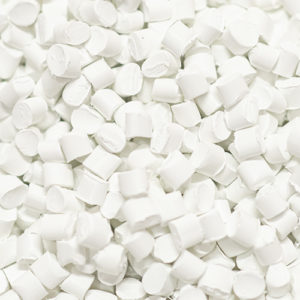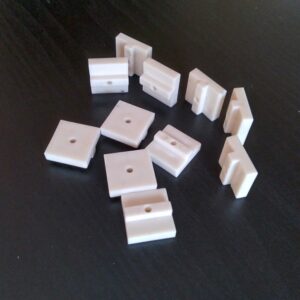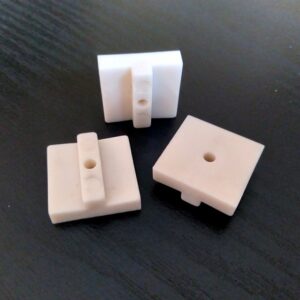
Materials

We work with a wide range of thermoplastics and elastomers to produce customized parts in the color of your choice. Don’t hesitate to contact our team to choose the material best suited to your project, in terms of thermal, chemical or physical resistance.
Recycled materials and bio-sourced plastics
Environmental protection and sustainable development are among our top priorities, which is why we offer you alternatives to traditional plastics, for the production of injection-molded and overmolded parts..
Recycled plastics
All the thermoplastics we use can be 100% recycled. This is the case for POM (polyoxymethylene), PA (polyamide), PP (polypropylene), PVC (polyvinyl chloride) and TPE (thermoplastic elastomer).
In particular, we work with Nylo®, a recycled polyamide created from fishing nets and invented by the French company Fil & Fab.
Bio-based plastics
These are plastics made entirely or partly from plant matter derived from wheat, corn, sugar beet, sugar cane or potatoes. They can also be made from organic waste and residues. Among the best-known are bio PE (polyethylene), bio PET (polyethylene terephthalate) and PLA (polylactide).
We work with BioMine®, a biosourced plastic composed of biopolymers of plant origin (corn) combined with mineral fillers, created by the French company FuturaMat.
Bioplastics use renewable organic matter and are therefore in line with the principles of sustainable development.
Contact us to find out more about the use of eco-friendly materials in plastics processing, injection molding and overmolding.
POM (Polyoxymethylene)
Polyoxymethylene (also known as acetal or polyformaldehyde) is a polymer from the polyacetal family, created by Du Pont de Nemours in 1959. It is a semi-crystalline material with excellent resistance to impact, wear, extreme temperatures and chemical agents. It is also a good insulator.
POM is an industrial thermoplastic, used in the manufacture of precision parts, automotive accessories and technical equipment.
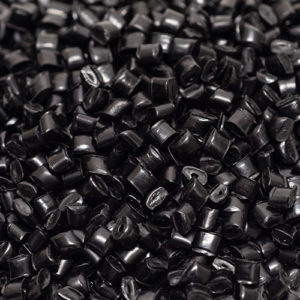
PA (Polyamide)
Polyamide (also known as nylon) is a semi-crystalline polymer discovered in the 1930s, used in the textile industry as well as in the production of household appliances, automotive equipment, electrical plugs and switches…
PA has good mechanical properties, and resists heat and electricity well. However, it is often sensitive to moisture.
There are many varieties of polyamide, suitable for the manufacture of different types of end caps and plastic parts. These include Rilsan (PA 11), which is derived from castor oil and is a bioplastic.
We also work with Nylo®, a recycled polyamide created from fishing nets and invented by the French company Fil & Fab.
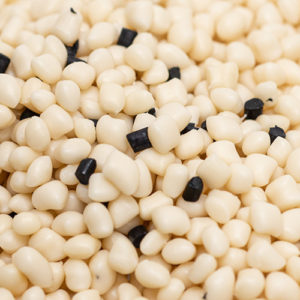
PP (Polypropylene)
Polypropylene (or polypropene) is an isotactic crystalline polymer discovered in 1954. It is an economical material, highly resistant, lightweight, chemically inert, resistant to high temperatures and suitable for use in the food industry. However, it is fragile at low temperatures and sensitive to UV light.
Polypropylenes used in injection molding are easily recyclable and reusable. On request, we can produce plastic parts and overmoldings in recycled polypropylene.
This material is widely used in automotive equipment, food packaging, household appliances, etc.
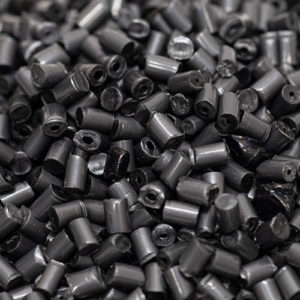
PVC (Polyvinyl chloride)
Discovered in the 19th century, PVC is a thermoplastic polymer made from 57% sea salt and 43% petroleum, and is resistant to moisture, chemicals and fire.
PVC comes in several forms (rigid, flexible, plasticized, expanded), adapted to different uses (piping, lining, packaging.).
PVC is widely used in industry, medical equipment, electrical wiring, etc.
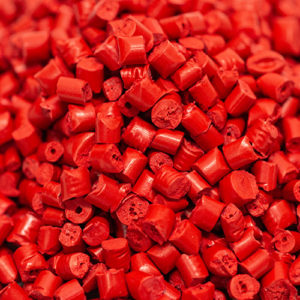
TPE (Thermoplastic Elastomer)
TPE is a generic name for thermoplastic elastomers (or thermoplastic rubbers). The term refers to a mixture of hard thermoplastic and soft rubbery material. There are many varieties of TPE: TPE-O, TPE-S, TPE-V, TPE-E, TPE-U, TPE-A, etc., with different physical characteristics (resistance to heat and chemical attack, compression set).
TPV or TPE-V is a vulcanized thermoplastic with enhanced thermal and physical resistance, and low compression set.
TPEs are used to create sports equipment, toys, automotive accessories, cable coverings, etc.
